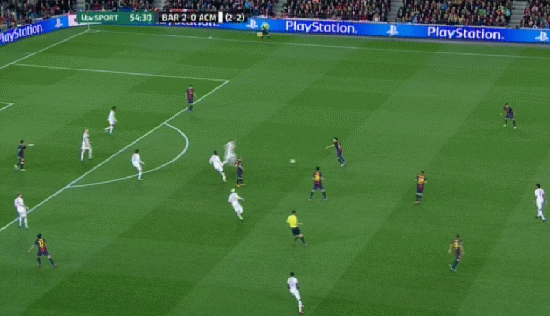Yet, on this the most important of footballing nights, I’ll be watching a man who hasn't even been a sure starter all year long: Xavier Hernandez Cruz – “Xavi” – who will be playing his final game for Barcelona.
Even in a Messi-Iniesta world, where diminutive sprites of shocking talent can run circles around freakish outperforming athletes like Cristiano Ronaldo, Xavi is an oddity. He’s short like them, but he doesn’t score goals, his dribbles aren’t going to make your jaw drop and his shot is surprisingly weak.
Messi just has to lift his foot and you know why people are in awe. Iniesta can trap the ball in a way that will have your eyes bulging. Neymar turns defenders into cinder blocks and Suarez’s constant, dogged effort is always evident, on the ball or off it. Yet when all of them don’t know what to do, they turn back to the one man who always knows everything that’s happening on the field.
Everything. To watch Xavi off the ball in a game is to stare at a weather vane in a storm. His head is constantly on a swivel, always mapping out everyone’s position on the field, always assessing the opportunity to create space. Consider the explanation of his technique to the Guardian’s Sid Lowe, in 2011, after Xavi’s Spain had just won a world cup.
“Think quickly, look for spaces. That's what I do: look for spaces. All day. I'm always looking. All day, all day. [Xavi starts gesturing as if he is looking around, swinging his head]. Here? No. There? No. People who haven't played don't always realise how hard that is. Space, space, space. It's like being on the PlayStation. I think shit, the defender's here, play it there. I see the space and pass. That's what I do.”
That is what he does. Xavi passes. And he does it better than anyone else.
Sir Alex Ferguson, the legendary Manchester United manager, used to joke that he’s sure he saw Xavi lose the ball, “once.” He’s gone through seasons completing hundreds more passes than entire clubs. He has played entire games without misplacing a single pass. His pass completion rate in all his time at the Camp Nou has never dipped below 90%.

But for the longest time those passes seemed to be going nowhere. Xavi was nicknamed "windshield wiper" for always moving the ball sideways, never taking it forward. A few years ago the Daily Mail, reporting on the Ballon D’Or awards ceremony, published a picture of the candidates with the headline, “the Best Players of the World (and Xavi).” They had to apologise soon enough.

The criticism, however, is not alien to Xavi. He has now spent 17 years at Barcelona, but not all of those were comfortable. Even at the height of his career, winning the Champions League twice in 2009 and 2011, with a World Cup sandwiched in between and two Euro Cups bookending everything, critics (usually English ones) continued to call his style of play "boring". He couldn't tackle, they said – or score, for that matter.

He didn't need to. Xavi was the centre-piece of tiki-taka, the quick-pass possession style of football that took both Barcelona and Spain to such great heights over the last decade. No matter what else was happening around the Camp Nou pitch, Thierry Henry arriving, Zlatan Ibrahimovic complaining, Carles Puyol losing steam, Tito Vilanova and Eric Abidal turning ill, Xavi remained on the centre of that pitch, pulling all the strings.
"Xavi," said Dani Alves, the fullback who played alongside him in Barcelona's greatest year, "plays in the future." Because his head is always turning, because he's always assessing space even if he's nowhere near the ball, Xavi doesn't put the ball where the player he's passing to is. He puts the ball where he wants the player to be.

My favorite Xavi assist is probably the pass that led to the first goal against Manchester United on the same stage as tonight's, the Champions League finals in 2011, not only because of its importance but because it exemplifies just how well he creates space.
Five United players are in a tight box around four Barcelona players. Xavi is being marked by one man, and suddenly makes a slight dink to the left, prompting all five defenders to look up and figure out who he is passing to. Simultaneously, Pedro pulls off to the right and suddenly Xavi has released the ball and it has turned into a goal.
It's not the most flashy – and Xavi has had plenty of flashy assists – but it did the job without the defenders even realising what just happened.
Now 35, Xavi has won just about everything, including a club-record 24 titles with 766 appearances for Barcelona. If his compatriot Iniesta doesn't recover from a slight injury, the grand old playmaker might even start his record 151st Champions League game and could end up with a 25th title. He's off to Qatar's Al Sadd, and the Camp Nou won't be the same without him.
Except that his decision to go to Qatar, in its echoes of another legendary Barcelona midfielder and later manager, might actually chart out Xavi's return to Barcelona. Xavi exemplifies the Barcelona identity and the style of football, so much that he has often been described as an ideologue. No one knows tiki-taka better than him. So who better to come back in a few years and try doing what Pep Guardiola and now Luis Enrique have done?
"We all know you'll come back," Iniesta said, once Xavi had announced his departure, "because you have Blaugrana blood."










